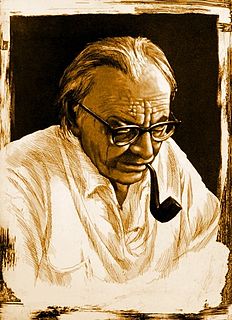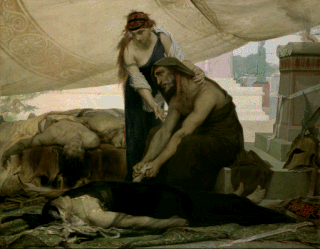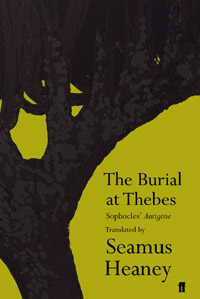
In Greek mythology, Antigone is the daughter of Oedipus and either his mother Jocasta or Euryganeia. She is a sister of Polynices, Eteocles, and Ismene. The meaning of the name is, as in the case of the masculine equivalent Antigonus, "worthy of one's parents" or "in place of one's parents". She is the protagonist of the Sophocles play named for her.

Antigonae (Antigone), written by Carl Orff, was first presented on 9 August 1949 under the direction of Ferenc Fricsay in the Felsenreitschule, Salzburg, Austria, as part of the Salzburg Festival. Antigonae is in Orff's words a "musical setting" for the Greek tragedy of the same name by Sophocles. However, it functions as an opera.

Antigone is a tragedy by Sophocles written in or before 441 BCE.

Oedipus was a mythical Greek king of Thebes. A tragic hero in Greek mythology, Oedipus accidentally fulfilled a prophecy that he would end up killing his father and marrying his mother, thereby bringing disaster to his city and family.

In Greek mythology, Polynices was the son of Oedipus and either Jocasta or Euryganeia and the older brother of Eteocles. When his father, Oedipus, was discovered to have killed his father and married his mother, he was expelled from Thebes, leaving his sons Eteocles and Polynices to rule. Because of a curse put on them by their father Oedipus, the two sons did not share the rule peacefully and died as a result, killing each other in battle for control over Thebes.
According to Sophocles' play Antigone, Haemon or Haimon, was the mythological son of Creon and Eurydice, and thus, brother of Menoeceus (Megareus), Lycomedes, Megara, Pyrrha and Henioche.

Creon, is a figure in Greek mythology best known as the ruler of Thebes in the legend of Oedipus.

In Greek mythology, Argia or Argea was a daughter of King Adrastus of Argos, and of Amphithea, daughter of Pronax. She was married to Polynices, the exiled king of Thebes, and bore him three sons: Thersander, Adrastus, and Timeas.

Ismene is the name of the daughter and half-sister of Oedipus, daughter and granddaughter of Jocasta, and sister of Antigone, Eteocles, and Polynices. She appears in several plays of Sophocles: at the end of Oedipus Rex, in Oedipus at Colonus and in Antigone. She also appears at the end of Aeschylus' Seven Against Thebes.

In Greek mythology, Jocasta, also rendered Iocaste and also known as Epicaste, was a daughter of Menoeceus, a descendant of the Spartoi, and queen consort of Thebes. She was the wife of first Laius, then of their son Oedipus, and both mother and grandmother of Antigone, Eteocles, Polynices and Ismene. She was also sister of Creon and mother-in-law of Haimon.

Oedipus at Colonus is one of the three Theban plays of the Athenian tragedian Sophocles. It was written shortly before Sophocles's death in 406 BC and produced by his grandson at the Festival of Dionysus in 401 BC.
The Greek Heroic Age, in mythology, is the period between the coming of the Greeks to Thessaly and the Greek return from Troy. It was demarcated as one of the five Ages of Man by Hesiod. The period spans roughly six generations; the heroes denoted by the term are superhuman, though not divine, and are celebrated in the literature of Homer.

In Greek mythology, the Seven against Thebes were seven champions who made war on Thebes. They were chosen by Adrastus, the king of Argos, to be the captains of an Argive army whose purpose was to restore Oedipus' son Polynices to the Theban throne. Adrastus, although always the leader of the expedition against Thebes, was not always counted as one of the Seven champions. Usually the Seven were: Polynices, Tydeus, Amphiaraus, Capaneus, Parthenopaeus, Hippomedon, and Adrastus or Eteoclus, whenever Adrastus is excluded. They tried and failed to take Thebes, and all but Adrastus died in the attempt.

The Phoenician Women is a tragedy by Euripides, based on the same story as Aeschylus' play Seven Against Thebes. It was presented along with the tragedies Hypsipyle and Antiope. With this trilogy, Euripides won the second prize. The title refers to the Greek chorus, which is composed of Phoenician women on their way to Delphi who are trapped in Thebes by the war. Unlike some of Euripides' other plays, the chorus does not play a significant role in the plot, but represents the innocent and neutral people who very often are found in the middle of war situations. Patriotism is a significant theme in the story, as Polynices talks a great deal about his love for the city of Thebes but has brought an army to destroy it; Creon is also forced to make a choice between saving the city and saving the life of his son.

The Burial at Thebes: A version of Sophocles' Antigone is a play by Irish Nobel laureate Seamus Heaney, based on the fifth century BC tragedy Antigone by Sophocles. It is also an opera by Dominique Le Gendre.

Œdipe à Colone is an operatic 'tragédie lyrique' by Antonio Sacchini first performed at Versailles on January 4, 1786 in the presence of King Louis XVI and Marie Antoinette. The libretto, by Nicolas-François Guillard, is based on the play Oedipus at Colonus by Sophocles. The premiere, intended to inaugurate the new theatre at Versailles, was not a success, possibly due to the quality of the performances, the staging or the acoustics. Marie Antoinette promised Sacchini a better production at Fontainebleau in the autumn, but the Affair of the Diamond Necklace meant she was unable to have her wish. The news that the production was cancelled is said to have hastened the death of the already seriously ill composer on October 9, 1786. Œdipe was given a posthumous performance by the Paris Opera at the Théâtre de la Porte Saint-Martin on February 1, 1787. This time the audience was warmly appreciative and the opera became one of the most popular pieces in the repertoire for several decades, reaching a total of almost 600 performances by 1844.

The Thebaid is a Latin epic poetry written by the Roman poet Statius. Published in the early 90s AD, it contains 12 books and recounts the clash of two brothers, Eteocles and Polynices, over the throne of the Greek city of Thebes. After Polynices is sent into exile, he forges an alliance of seven Greek princes and embarks on a military campaign against his brother.
In Greek mythology, Megareus or Menoeceus (Μενοικεύς) was a warrior of Thebes, who figures in the war of the Seven against Thebes - the struggle between Eteocles and Polynices, the twin sons of Oedipus, for the throne of Thebes. He was known for his large stature, and is considered an anthropomorphic representation of his father's pride by some literary scholars.

Antigone is a play by the Attic dramatist Euripides, which is now lost except for a number of fragments. According to Aristophanes of Byzantium, the plot was similar to that of Sophocles' play Antigone, with three differences. The date of the play is uncertain, but there is evidence that it was written late in Euripides' career, between 420 BCE and 406 BCE.
Antígona Furiosa, written in the period of 1985-86 by Griselda Gambaro, is an Argentinian drama heavily influenced by Antigone by Sophocles, and comments on an era of government terrorism that later transformed into the Dirty War of Argentina.Antígona Furiosa was first published 1989 in Griselda Gambaro: Teatro 3 in Buenos Aires, after it stayed many years hidden while Gambaro was in exile in Barcelona. The play premiered September 24, 1986 at the Goethe Institute in Buenos Aires under the direction of Laura Yusem.
















